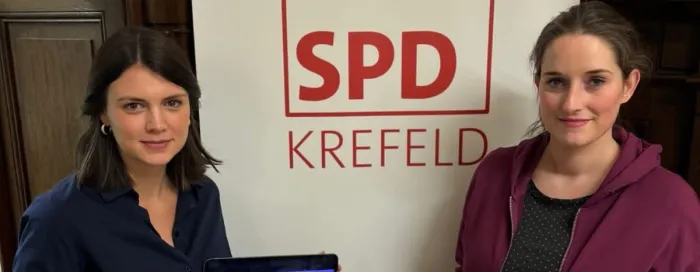This interview with Maxi Katharina Leuchters, member of the City Council of Krefeld (SPD/Germany), is part of our #SafePlace4Women campaign and of our series “#ProgressiveLocalStories”, aimed at raising awareness on the many positive initiatives implemented by progressive cities and regions in Europe when it comes to promoting a social, fair and sustainable Europe.
Why is Krefeld at the forefront of combating violence against women?
The adoption of the resolution underscores that consistently combating violence against women is a cross-party objective. In local politics, we can initiate key measures, accompanied by more far-reaching initiatives at Land, federal and EU level. A feminist approach to local politics is the basis for addressing gender-based violence because only when sexism and discrimination against women are taken seriously can equality be achieved between women and men. We have made a start here, but we still have a long way to go to meet our goal.
What specific steps have you successfully taken to make Krefeld a safe place for women?
The issue of order and safety in the city centre is playing an important role at the moment. Together with the city authorities, we were able to successfully launch an initiative to make women safer on the party and pub scene. Inspired by initiatives from other cities, our party wanted women to feel safe in Krefeld in the evening and at night. Therefore, the "SaferSpaces" project is now being rolled out, having already been tested at a Krefeld club. Women can directly contact specially trained staff through QR codes displayed in restaurants, pubs and clubs. The intention is for women to be able to contact these staff members as easily as possible.
On 2 November Krefeld adopted a declaration undertaking to make it a #SafePlace4Women. What concrete steps do you plan to take?
We would like to initiate a number of measures after adopting the declaration. In the Committee for Administration, Safety and Order we have regular consultations with the police. We would like to work together here to develop a preventive approach to combating violence. We would also like to discuss with the local police how to show domestic violence and violence against women in local crime statistics. Work will also be carried out on an information campaign highlighting the dangers of sexist advertising and what assistance is available, such as the complaint form provided by the German Advertising Standards Council. We also want to display more information material on gender-based violence in our media centre. Another important measure for us is a clear commitment to women's shelters and other such support services. We are pleased that the Krefeld City Council is going to prioritise women's protection and needs even at a time when municipal funds are tight.
How can the European Union help to make your city a safe place for women?
I think there are a number of ways the EU can support women's safety (and equality) at local level. More account could be taken of gender-related criteria when allocating EU funding. This is particularly important, for example so that it can be said that funding benefits both genders. Moreover, gender equality could be better taken into account in the country-specific recommendations in the European Semester. Of course, launching EU-wide campaigns is also helpful in raising awareness of the issue and putting it on the agenda at different levels.
***
© Photo credits: Maxi Katharina Leuchters
The header photo shows Maxi Katharina Leuchters and Lena Marie Wagner, both members of the City Council of Krefeld (SPD/Germany).
